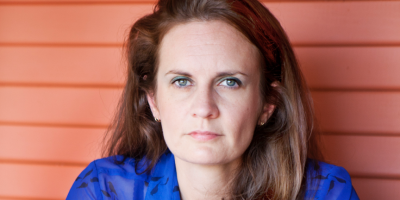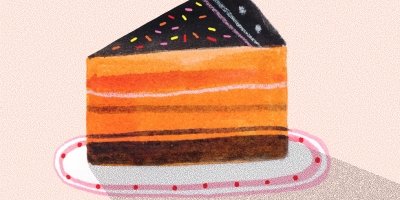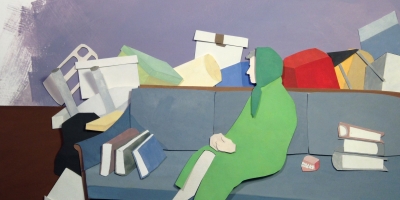Fiction
See You in the Morning
by Mairead Case
Louise turned on the radio in the car, to that afternoon show on the college station—those girls don’t always work the board right. Both their names begin with K and they sound glossy. Sometimes they are nervous about liking what they like, which is dumb. It’s not like music can make you sick. I remember once I was making a mixtape for Ben and I sat four or five minutes, deciding whether to use a song that had “fuck” in it. Then I realized how dumb I was being. I didn’t ask them to put it in. It wasn’t about me.
In the car we just listened a while. One nice thing about the station is they don’t have to play anything corporate or brand-new, so for example, right now, the girls were playing Bo Diddley. I wondered if Louise thought, What kind of a moron picks her first kiss in front of a refrigerator? I looked at her fingernails, which were all different blues and one gold, bright against the steering wheel. She got a cigarette from the glove compartment and her hair brushed my knee. She rolled down her window and breeze poured into the car like water, and we just went over a bridge.
I tried to think of something to say that wouldn’t be sexual or impersonal. I remembered the last book I read on break at the store. It was about octopi. Did you know, I asked Louise, that octopi are observational learners? She looked at me with one eyebrow up. No, she said, I didn’t. They are, I said. After they have babies they stop eating and die so the little ones have to learn from what they see, not what they’re taught.
She laughed. So like, one octopus could start goofball swimming, just to play a joke, and the little ones would do it too? I guess, I said, only octopi aren’t really creative.
You’re a secret weirdo, huh? she asked, and I felt proud, not embarrassed. Tell me what else you know about octopuses, she said, and notched the radio down. It was the Big Bopper saying, Hello, baby. I know these songs because Mom listens to them while she’s cooking.
Well, I said, last week Ben was late picking me up from work, and I was so tired I thought I might fall asleep at the bus stop, so while I waited for him I read about octopi. Cool, she said, like of course you did. They have three hearts, I told her, and their brains wrap around their throats. That’s so rad, she said, like you’d tap your neck if you had an idea. Yeah, I said, I guess you would. What’s cool too is how they leave bad situations—either they’ll run headfirst, which looks like waving because they don’t have skeletons, meaning they can slide off hooks because no bones catch, or they’ll shoot a wall of ink. The ink will get in everyone’s face, or it will outline another octopus for distraction.
Suddenly I saw Ben’s face, like what the hell are you doing, going on about octopi? Are you four? When they are scared all of a sudden, I told Louise, they turn pale and flatten out like capes.
When I was reading about them, I told her, it was just me and a little boy in the sea section. His name is Timmy, he comes to storytime and his favorite color is red. I didn’t tell Louise how much I cared about those kids. Kids like what they like, and they are not embarrassed about their work. For example, Timmy wrote a bunch of three-sentence stories in the back of a yellow steno pad, and don’t tell him it’s not a book.
Also, I said, in Hawaiian myth, octopi are the lone survivors of an alien universe. Their biggest parts are their arms, so in a way they see by touch, through texture variation. It’s different than feeling your way along the walls in a dark room. Yeah, Louise said, I guess it is. When her arms move, you can see the cords. Love at first sight is maybe seeing how someone’s muscles work. By then we were at my house, and those girls were playing that Neil Young song that sounds like the beach. I don’t know how I know all these songs.
I’m sorry I tried to kiss you, I said. I didn’t mean it to be weird. It’s okay, she said, really no big deal. I really just wanted to hang out with you. Yeah, I said, well now I know. I unbuckled my seatbelt, got out of the car, and cannonballed into the house. I didn’t look, but I heard her tires moving away.

People who came into the bookstore today: two girls in matching whiskery earrings who said their names were Mitten and Queen. A boy in a trenchcoat, who asked for the Spider-Man comics section because he is learning to draw crouching. A woman wearing too much flower perfume, she wanted something sad for reading on the treadmill. If you keep walking while you’re reading, she said, it won’t stick in your heart. A man wondering if I knew the book where nuns made boys kneel on bags of marbles for punishment. A little boy with a neon green military print backpack; on the back it said MY NAME IS but he hadn’t written his name in yet. In the stroller, his sister drew stars on a piece of paper, but they were starfish, not stars in the sky. Then she learned how As are like Hs, just with rounded tops, so she drew a bunch and her face looked like riding a roller coaster: A A A A A A A A A.
Sometimes when I’m reading on my break, I imagine polka dots filling up the margins, then going off the page and surrounding me like a blizzard that gets bigger. They hum and make a loud wall of color. I think if I could write everything down, important parts would start to pulse.

One part I remember about Grandma is her dollhouse. Mom isn’t attached to it, so I’m not sure where it came from. I remember the walls were all green, crimson, and gold, so inside it always seemed like Christmas. There was one navy room upstairs with a cradle, only the baby was lost, so when I played house, I said either she just died or her mother was in the hospital in labor.
I didn’t have anyone to play with, so I decided I was a ghost, and I’d write little notes and stick them under the chairs, or write MOTHER MARGARET on the tiny mirror in nail polish with a bobby pin. I haunted the house. One day I decided hell was underneath it, so I spent all afternoon making flames out of construction paper and glitter glue and this red yarn I found. When Grandma came to get me for dinner, she looked sad, and took it all down and said this isn’t that kind of house, honey. Grandpa heard her and put his newspaper up close to his face, like always when he’s about to laugh but doesn’t want to make her mad.

I went over to Mr. Green’s last night and he was wearing a belt buckle I’ve never seen before. Mr. Green usually dresses nice, meaning not like a man who sits around and reads all day, which is what it seems like he does. He wears jewel colors and not a lot of patterns. It looks soft but with shape. The only other place I’ve seen colors like that is at church during Advent, so I always half-expect hugging him to smell like incense. When I was little Mom would say the purple candles are for waiting, and pink is for hope. Anyway, this buckle looked like a cowboy’s belt, it had turquoise in it and red stones too, like circles of blood weeping out his waist.
Is it a big day? I said and Yeah, he said, it’s my birthday. Every day on my birthday I read a poem and eat some cake. Do you want to do that with me, kid? Okay, I said, and I wished I’d worn something nicer than my sneakers. On the other hand, I didn’t—it looked right, me with my shoes covered in that red dust I always stir up walking home, and that scab from the box top at work, and Mr. Green with his fancy belt. I did wish I’d known so I could write him a card. Usually I am better in writing. I want to tell him how grateful I am to come over and sit on his porch all the time, and that he talks to me like an adult even when I don’t know what I’m doing.
My dad is nice, I love him and not just because I am supposed to. But sometimes when he tells me to calm it down, I see he’s worried I am different. If I am different, then I’m either his responsibility or a threat. I am grateful for his love, but it does not let me be my own person. My dad would never ask me about dates like Mr. Green does. He doesn’t even know I had one.
Mr. Green went into the back room, and when he came out he was wearing a thin blue scarf with gold threaded through it, like sun fingers. I never saw that before, either. My grandma called those sparkle-plentys, I told him, the clothing you wear to be special. I like that, he said. It sounds like licorice candy. Then he made a joke about sun fingers like chicken fingers, and we talked about what you would dip them in. How they would taste. Maybe like dust, Mr. Green said. Dust or coins. Some people eat money, kid.
Then I sat down at the table and he played jazz he likes. It’s Mingus. You say it hard on the ming, like a bell sounding. Before I met Mr. Green, I did not know you could whistle jazz, but yes you can. He picks one instrument and just sings it, which is nice because it lets you imagine all the others. It puts half the noise inside your head, half out. When Mr. Green sat back down, he had the scarf tied around his head, and he was holding a cake.
It was a beautiful cake—pale blue icing, dusted with something glimmery but hard, like if the whites of your eyes were seashells. It looked like a summer other people had, one with lawn chairs and sunhats and toddlers building castles. Summer of strawberries and mint and lovely mothers standing on porches with wind combing their hair. It was not a summer where I had to work at a bookstore, as much as I like the bookstore, most days. Sometimes food seems like it time-traveled to get to you.
There were two squirrel-eye-sized holes in the top where candles must’ve been, but Mr. Green took them out. The cake was chocolate, thick but not heavy. We didn’t sing, he just halved it and cut one half in two, gave us each one and took the rest back to the kitchen. It was the quietest birthday ever, and I wasn’t sure if he wanted it that way or if he was just lonely. I worry about what people really want. This, I guess is my greatest fear, being so weird that I am alone, except on birthdays when I eat cake with the nut from next door.
I used to have nightmares about it when I was little, bad dreams about me in a rocking chair facing a white wall, going back and forth and back until my brain just stopped. This is really delicious cake, Mr. Green, I said, and he said, Isn’t it? They always do such a good job. I wonder if he knew he was going to share it with me when he bought it.
When Mr. Green finished his slice the plate was mirror-clean, though I never saw him scrape any icing. Now it is time for the poem, he said, and I felt somber because clearly he does this every year and maybe nobody else has done it with him. Here is the poem, he said, and he took it out of his pocket. In my beginning is my end, it started.
I read a line and then he did, the paper open between our cake plates on the clean table. Me then him then me then him, and that’s what felt like singing happy birthday. I wonder if it’s fair to read a poem aloud when you haven’t heard the writer’s voice. When you hear someone’s voice you can tell how good they are at listening. At the end, Mr. Green clapped me on the back like a man and said, Thanks for spending my birthday with me, kid. I’m going to turn off the sprinklers and then I’m going to read awhile okay? And I said, Okay, happy birthday, Mr. Green.
I let myself out and walked home across the street, where Mom was making hamburgers for dinner. There are trees in Mr. Green’s front yard and there is a nest in one, though I’ve never seen the bird. I think about that a lot, how if you are a bird, your nest is home. Absolutely everything else is the world. You stick a wing out, and there you are in the world.





